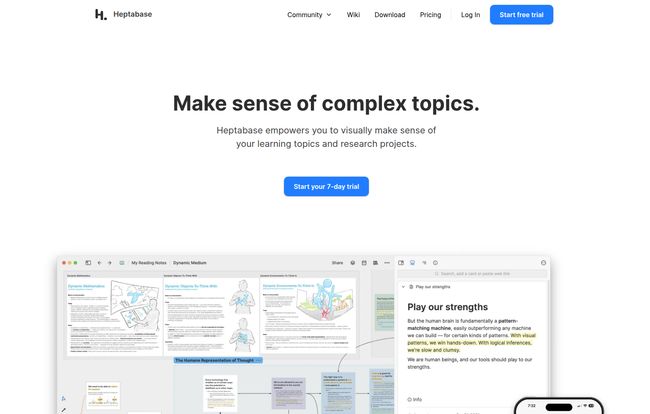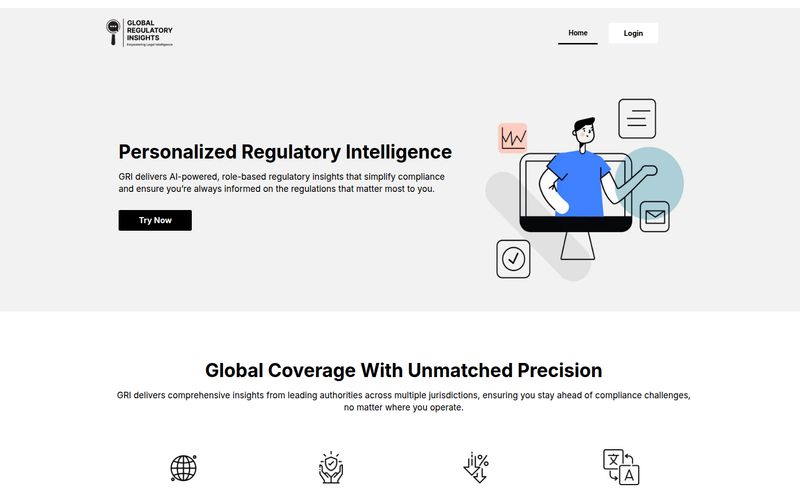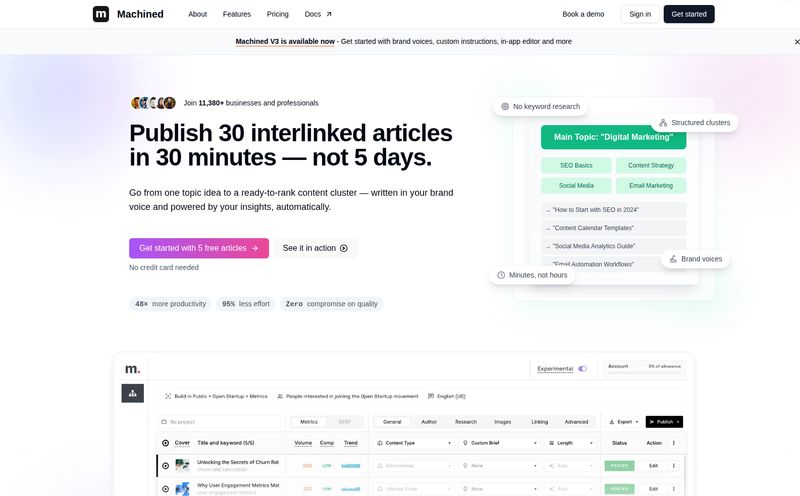If I took a screenshot of my digital life, it would look like a hoarder’s garage. I’ve got stray notes in Apple Notes, half-baked ideas in Google Docs, a graveyard of Trello boards, and a desktop so cluttered it gives my graphic designer friend an actual twitch. For years, I've been on a quest for the perfect “second brain,” that one mythical app that will finally bring order to my chaos.
I’ve tried them all. Seriously. From the beautiful databases of Notion to the intense, interconnected web of Obsidian, each one had its moment of glory before I inevitably fell back into my old, messy habits. So when I heard about Heptabase, another contender in the crowded knowledge management space, my first thought was a skeptical,
Oh, here we go again.
But something about its core promise—"Make sense of complex topics"—hooked me. It wasn't about just storing information. It was about understanding it. And as someone whose job involves untangling complex SEO strategies and market trends, that sounded less like a feature and more like a lifeline. So I jumped into their 7-day free trial. And folks, I think I might be in love.
What Exactly is Heptabase? (And Why Should I Care?)
Heptabase isn’t just another note-taking app. That's like calling a Swiss Army knife a butter knife. It’s a visual thinking environment. Imagine your desk is a giant, infinite whiteboard. Every article you read, every YouTube video you watch, every random thought you have becomes a little card you can place on this board. You can draw lines between them, group them into clusters, and physically see the connections forming. It’s like a detective's evidence board for your brain.
Instead of endless lists and folders, you get a spatial, visual map of your knowledge. For anyone who has ever tried to explain a complex idea by frantically waving their hands and drawing invisible diagrams in the air… this tool gets you. It's built for visual learners and anyone tackling big, messy projects—from academic research and content strategy to planning a novel.

Visit Heptabase
My First Impressions: Finally, a Digital Space That Thinks Like Me
Getting started was surprisingly smooth. The magic truly happens when you open your first whiteboard. I started by dumping in a few articles I'd been meaning to read for an upcoming piece on Google's latest algorithm update. Each one became a card. I pulled a key quote from one, a statistic from another. Then, I drew an arrow connecting them. A little lightbulb went off in my head. This wasn't just storage; it was active thinking.
You can create mindmaps to branch out from a central idea, set up Kanban boards to track the progress of a project, or build tables to compare data. And it all lives on the same canvas. It’s fluid. It feels less like operating software and more like thinking out loud. For the first time, an app didn’t force me to adapt to its structure; it adapted to my scattered, non-linear thought process. What a concept!
More Than Just a Pretty Face: The Powerhouse Features
While the visual whiteboard is the star, the supporting cast of features is what makes Heptabase a true workhorse. It's not just about looks; there's some serious muscle under the hood.
A True Multimedia Hub
This is where things get really interesting. You can drag and drop a PDF directly onto your whiteboard and highlight sections, and those highlights can be dragged out as their own individual cards. That's cool. But what really blew me away was the YouTube integration. You can drop a video link, and Heptabase will not only embed the video but also provide a full, searchable transcript. You can highlight parts of the transcript and, you guessed it, drag them out as cards linked directly to that timestamp in the video. For anyone doing video-based research, this is an absolute game-changer.
Built for Speed and Accessibility
Two words that will make any serious power user weep with joy: Offline Access. A lot of these fancy web-based tools become useless bricks the second your Wi-Fi hiccups. Not Heptabase. You can access and edit everything without an internet connection, and it all syncs up beautifully once you're back online. The real-time sync across their desktop and mobile apps is also flawless. I could add a note on my phone while waiting for coffee, and it would be sitting on my whiteboard on my laptop by the time I got back to my desk. They claim “blazing-fast speed,” and honestly, they're not exaggerating. It's snappy.
Teamwork Makes the Dream Work
While I primarily use it as a solo brain-extension, the collaboration features are robust. You can invite friends or teammates to your whiteboards to brainstorm in real time. It feels a bit like a mashup of Miro and a deep knowledge base. It’s perfect for project managers trying to synthesize market insights or creative teams trying to organize inspiration for a new campaign.
Who Is Heptabase Actually For?
Look, this isn't the tool for making your weekly grocery list. It can do that, sure, but it'd be like using a bazooka to open a can of beans. Heptabase is for people who are deep in the weeds of a complex topic.
I see it being perfect for:
- Academic Researchers & PhD Students: Managing literature reviews and synthesizing findings visually would be incredible.
- Content Creators & SEOs: Mapping out topic clusters, planning content strategy, and pulling research from dozens of sources.
- Project Managers: Building a central source of truth for a project that includes strategy docs, user feedback, and market analysis.
- Authors & Writers: Outlining plots, developing characters, and keeping track of world-building details.
If your brain is a chaotic mess of interconnected ideas, Heptabase provides the canvas to lay it all out. If you just need a simple to-do list, you might be better off with something simpler.
The Elephant in the Room: Heptabase Pricing
Okay, let's talk money. Heptabase is a premium tool with a premium price tag. There's no free-forever plan, which will be a dealbreaker for some. You start with a 1-week free trial, and after that, you're on a paid plan.
| Plan Type | Effective Monthly Cost | Billing Cycle |
|---|---|---|
| Monthly Plan | $11.99 | Billed monthly |
| Yearly Plan | $8.99 | Billed $107.88 annually |
Is it worth it? For me, the answer is leaning towards a resounding yes. If you're a professional who bills by the hour, the amount of time and mental friction this tool saves could easily pay for itself within a month. Compared to competitors like Roam Research ($15/month), the pricing is competitive. For a student or a casual user, the price might be a bit steep. My advice? Use that 7-day trial for all its worth. Put it through its paces on a real project and see if the workflow clicks for you.
Heptabase vs. The World: A Quick Comparison
I know what you're thinking. How does this stack up against the giants? In my experience:
- vs. Notion: Notion is a structured database powerhouse. Heptabase is a free-form thinking canvas. If you want to organize with tables and strict hierarchies, Notion wins. If you want to explore messy, emerging connections, Heptabase is king.
- vs. Obsidian: Obsidian is the ultimate tinkerer's tool, endlessly customizable with plugins. Its graph view is cool but feels secondary to the text. In Heptabase, hte visual whiteboard is the primary interface, making it feel more intuitive for spatial thinking.
Heptabase has carved out a fascinating niche for itself. It’s not trying to be an all-in-one life OS like Notion. It's laser-focused on being the best place in the world to understand complex things.
The Minor Annoyances (Because Nothing's Perfect)
As much as I'm gushing, it's not without its quirks. There is a bit of a learning curve. Understanding the interplay between the Journal, your Notes, and the Whiteboards takes a little getting used to. It's not as instantly intuitive as a simple note app, but the payoff for that small initial investment is huge.
And, as mentioned, the price will be a barrier for some. I also wish the mobile app had the full whiteboard functionality of the desktop version, but for quick capture on the go, it does the job just fine.
Conclusion: Is Heptabase Your Next Digital Brain?
After a week of living inside Heptabase, my digital hoarder’s garage is starting to look more like a well-organized workshop. It hasn't magically solved all my problems, but it has given me a powerful new way to tackle them. It bridges the gap between collecting information and truly understanding it.
If you're a visual thinker, a researcher, a strategist, or anyone who feels like their best ideas are getting lost in a sea of text files and bookmarks, you owe it to yourself to give Heptabase a try. It might just be the tool that finally helps you connect the dots.
Frequently Asked Questions
- What is Heptabase best used for?
- Heptabase excels at learning, research, and project management where you need to synthesize information from many sources. It's ideal for visual thinkers who want to map out complex topics using whiteboards and mindmaps.
- Does Heptabase have a free plan?
- No, Heptabase does not offer a free-forever plan. However, it provides a full-featured 7-day free trial so you can test all its capabilities before committing to a subscription.
- Can I use Heptabase offline?
- Yes! One of its strongest features is full offline access. You can create, edit, and organize your notes and whiteboards without an internet connection, and your work will sync across all devices once you're back online.
- How does Heptabase compare to Notion or Obsidian?
- Heptabase is more visually focused than both. While Notion is built around structured databases and Obsidian is a text-centric, link-heavy network, Heptabase's core is the visual whiteboard, making it better for spatial and free-form thinking.
- Can I collaborate with my team in Heptabase?
- Yes, you can invite unlimited collaborators to work with you on whiteboards in real time. This makes it a great tool for team brainstorming, strategy sessions, and collaborative research projects.
- Can I get my data out of Heptabase?
- Yes, Heptabase allows you to export all of your cards, including any attachments. This is a crucial feature for data ownership and ensures you're not locked into the platform.



